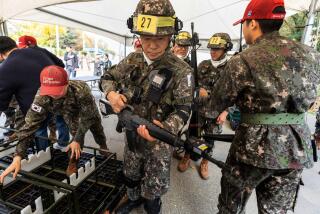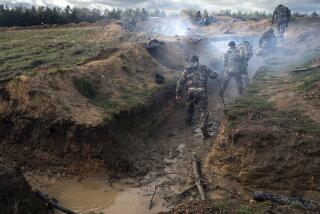New Iraqi Army Makes Its Debut
- Share via
KIRKUSH, Iraq — On a dusty plain, a squadron of rifle-toting men in camouflage forms a rough wedge that zigzags toward its objective, a small cluster of earthen mounds. In a deft set of maneuvers, the men fan out, flank the position, advance, and then completely overrun the two “enemy” defenders who roll over as though dead.
But like children playing war, the soldiers have merely mimed the action of firing their guns because their trainers didn’t have blank ammunition for them to use.
For the record:
12:00 a.m. Sept. 18, 2003 For The Record
Los Angeles Times Thursday September 18, 2003 Home Edition Main News Part A Page 2 National Desk 1 inches; 44 words Type of Material: Correction
Iraqi army -- An article in Tuesday’s Section A about the new Iraqi military implied that the first battalion of recruits would be trained outside Iraq. The article should have said that a select group of young officers would be trained outside the country.
Thus was the new Iraqi army -- recruited in July by the U.S.-led occupation authority -- presented publicly for the first time Monday.
The initial battalion, 750 strong, is due to graduate from nine weeks’ training Oct. 4, becoming the seed of a new military force meant to succeed the 400,000-man army of ousted dictator Saddam Hussein.
At a time when many Americans see the occupation of Iraq as not going well, the leisurely two-year buildup to a new Iraqi army has gone out the window.
At a well-orchestrated visit arranged for journalists, U.S. Maj. Gen. Paul Eaton, head of the coalition team overseeing formation of the new army, said that training of up to 40,000 soldiers is to be expedited, and completed in just one year. The accelerated timetable, he said, would be accomplished by taking younger officers from the old Iraqi army and giving them three to five months of officer training, so that they will, in turn, be able to train fellow Iraqis.
“Every Iraqi soldier that we train and get into the army represents a greater Iraqi security, which is why we’re interested in getting this done as quickly as possible, so that Iraq can look to its own army for its own security and pride,” Eaton said.
The first battalion being trained will have its own officers, but they will carry only light weapons and report to a coalition divisional commander, officials said. At first, the Iraqis will have only limited duties, looking after borders and military sites, said Brig. Jonathon Riley, a British army officer working with Eaton.
The training, which Eaton said would take place at an unspecified site outside Iraq, would be designed to “ensure the problems of the last regime are eliminated and that we get soldiers -- leaders -- who are going to train and develop soldiers the way we want them to,” he said.
Eaton cited the example of the German army which, after the collapse of the Berlin Wall in 1989 and Germany’s later reunification, absorbed members of the younger officer corps of the old East German army who were considered untainted by their former state’s Marxist policies. Similarly, he said, young officers under Hussein are less likely to be sullied by Baathism.
About three-quarters of the inductees in the first battalion had been involved in some form of military or security service during Hussein’s regime. But the recruits have been screened to exclude anyone of high standing in the Baath Party or those suspected of participating in crimes under the regime.
Inducted at recruiting centers in Basra, Baghdad and Mosul, they also reflect Iraq’s religious and ethnic mix. The first battalion is about 60% Shiite, 25% Sunni, 10% ethnic Kurd and 5% from other minority groups.
Australian army Maj. Doug Cummings, an officer assigned to the project, said that there had been at least one case in which a Baathist secret policeman made it into the new force. But he said that individual was identified by a fellow recruit. “We checked it. It was legitimate, and so he was removed,” he said.
In conversations with reporters, trainees praised the conditions and spirit of the new army.
A 19-year-old recruit from Basra, Ali Hassan, said he would have no difficulty fighting fellow Iraqis if they opposed the U.S. military presence. His hatred for Hussein’s regime goes back to when his brother had his ears cut off for deserting the former army. He said he has no interest in any Iraqi who would like to bring Hussein back. “If it is a choice,” he said, “I will fight with the American people against these Iraqis.”
A burly sergeant recruited from Najaf agreed. “Now everyone is equal,” said Akil Shakur Nasr Khazali, 36. “We want to say that we’re all Iraqi, and we all are proud to be in the new Iraqi army.”
The Kirkush base, in a desert area about 25 miles from the Iranian border, had been started by the Iraqis as a military base in the 1980s but was never completed.
When the Americans arrived to turn it into the first training camp for the new Iraqi army two months ago, the buildings were just shells, thoroughly looted, without doors on hinges or glass in the windows. They also lacked both heating and air conditioning.
Today, the barracks area has been finished, providing air-conditioned mess halls, fan-cooled rooms and indoor showers and toilets with running water. Two weeks ago, the coalition also finished a mosque for the soldiers.
Much of the actual training is done by employees of the Vinnell Corp., a unit of defense contractor Northrop Grumman, which received a $48-million contract in July to help create the new Iraqi army. Vinnell has been providing military training in support of U.S. policy in Saudi Arabia for 25 years.
It was clear from the recruits that they felt they were being treated much better by their Western trainers than they ever had been in previous military service, where a raw private earned as little as $4 a month.
While in training, they get $60 a month. They have eight hours of instruction a day, with Fridays off. And after their first five weeks, they were allowed a five-day leave to visit their families.
Cummings, the Australian officer, said there were no drill sergeants shouting in the faces of recruits in this boot camp. “In this culture, it’s counterproductive,” he said. “Doesn’t work at all.”
Early mornings consist of physical training and running. For the rest of the day they practice light infantry skills, such as movement on the battlefield and the handling of small arms, and receive classroom instruction.
The soldiers are equipped with AK-47 rifles that, instructors said, had been confiscated by the coalition forces in Iraq from former military stores.
At a class in ethics Monday, an American instructor with wavy blond-gray hair lectured the uniformed recruits using an overhead projector, while two interpreters relayed his words in Arabic and Kurdish.
“When soldiers are moral, the moral power binds them together and fits them for action,” he told them. “A good soldier is good in his heart.” The soldiers looked on intently.
As a case study, he cited the discovery by a small group of American troops of almost $300 million in U.S. currency and gold on the grounds of one of Hussein’s palaces in April. There was no one around to see them when they found the money, he recounted.
“What do you do?” he asked the Iraqis. “Think about it, and I’ll be back.”
During the break, recruit Sabeer Saeed Mohammed Joubari, a 19-year-old from the small Kurdish town of Akra, pondered what he would do with the money.
“I think I would give it to someone to kill Saddam Hussein,” he said.
More to Read
Sign up for Essential California
The most important California stories and recommendations in your inbox every morning.
You may occasionally receive promotional content from the Los Angeles Times.













